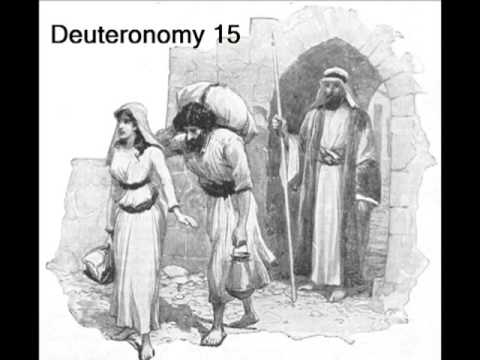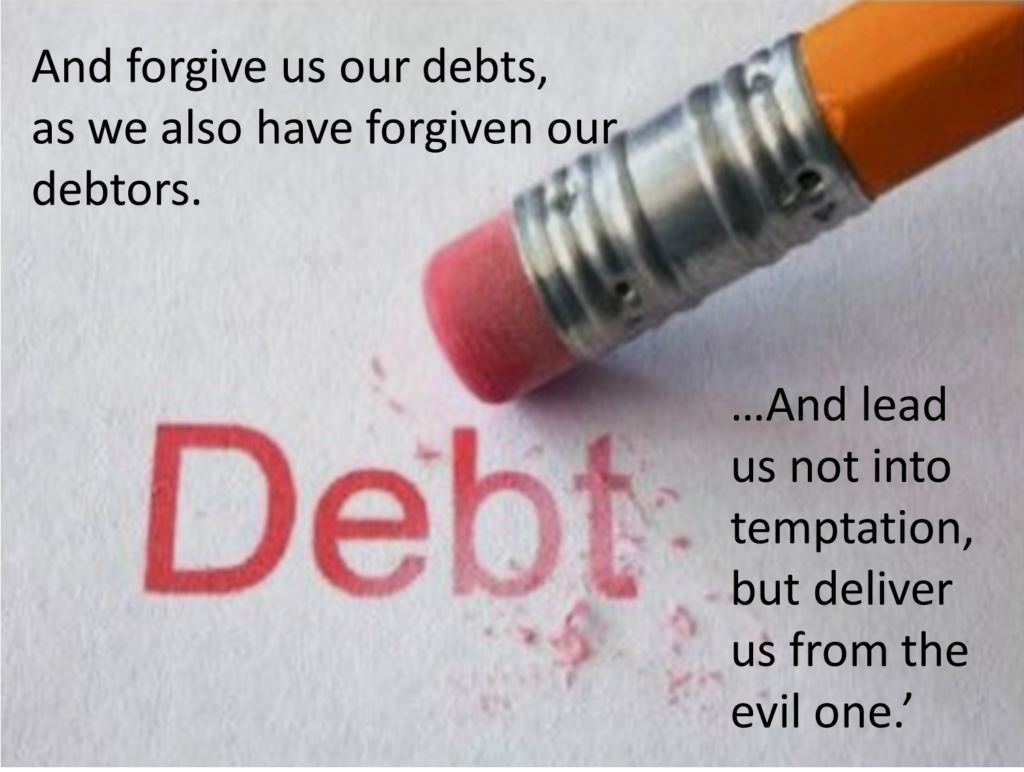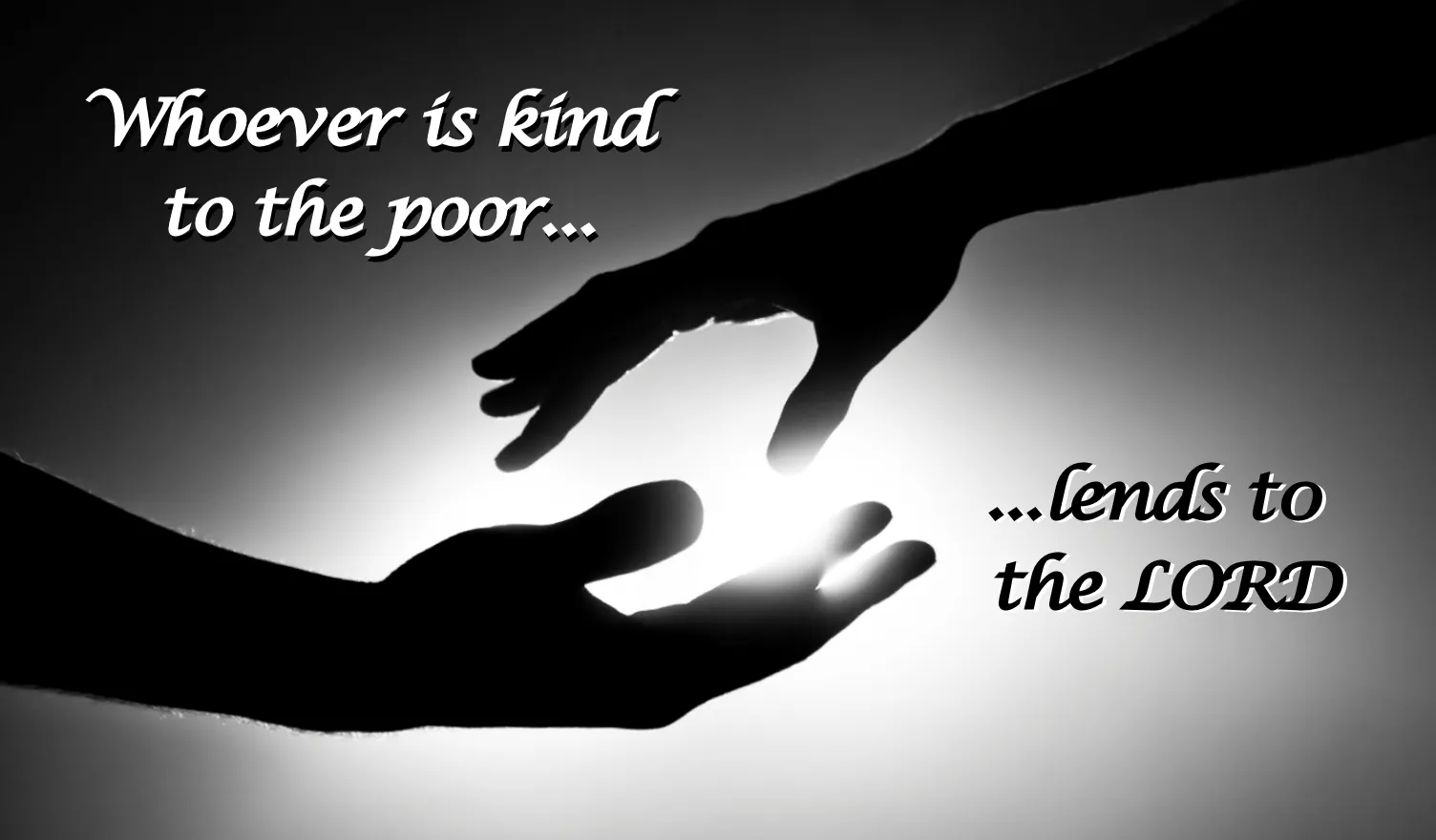Deuteronomy 15: Lessons on Lending and Debt Forgiveness
Introduction: In Deuteronomy 15, God teaches believers to set themselves apart for Him through seven Biblical principles on lending and debt forgiveness. First, you must forgive your debtors, just as God has forgiven your debts. Second, He will bless you when you forgive debts, just like He blesses you when you tithe. Third, He expects you to be a generous lender, even when you do not expect the return of your money. Fourth, if you withhold money from the poor, there may be consequences for your actions. Among other things, your prayers may be “hindered”. Fifth, He allows the poor to exist to test the hardness of your heart. Sixth, instead of consumer debt, He wants you to become a slave or “bondservant” to your master Jesus. Seventh, give thanks that you have been freed from the debts that you can never repay through Jesus’ blood.

Let the love of Jesus be reflected in your lending and charity1
1. Forgive Your Debtors Just as Christ Has Forgiven Your Debts. Dt. 15:1-3.
The Jews were required to forgive debts once every seven years. God did not want His people in permanent bondage. He freed the Jews. Thus, He prohibited the Jews from placing each other into long-term debt for more than seven years: “At the end of every seven years you shall grant a remission of debts. 2 This is the manner of remission: every creditor shall release what he has loaned to his neighbor; he shall not exact it of his neighbor and his brother, because the Lord’s remission has been proclaimed. 3 From a foreigner you may exact it, but your hand shall release whatever of yours is with your brother.” (Dt. 15:1-3). “[W]e will forego the crops the seventh year and the exaction of every debt.” (Neh. 10:31). The cancellation of debts took place in the Fall during the Feast of Tabernacles, also called the Feast of Booths or Sukkot: “Then Moses commanded them, saying, ‘At the end of every seven years, at the time of the year of remission of debts, at the Feast of Booths.”’ (Dt. 31:10). The Feast of Booths or Tabernacles celebrated the time when God dwelt with His people. It foreshadowed the time when Christ came to dwell with us and the future Millennial Reign when He will again dwell with people on Earth. Like the Jews, God wants to free us from captivity. Have you placed yourself into bondage with long-term debt?
If you don’t forgive your debtors, God won’t forgive your debts. Christians are also obligated to forgive the debts that others owe them. The Lord’s Prayer implores us to give those that owe debts to us (Matt. 6:12). As one of His final seven statements, Jesus also asked God to forgive the debts of those who murdered Him on the cross (Lk. 23:34). Jesus also warns that God will not forgive your debts if you fail to forgive the debts that others owe to you “For if you forgive others for their transgressions, your heavenly Father will also forgive you.” (Matt. 6:14). He also warned that if you do not forgive those who have caused you harm, your Heavenly Father will not forgive you: “But if you do not forgive others, then your Father will not forgive your transgressions.” (Matt. 6:15; 18:34-35, Mk. 11:26). “Do not judge, and you will not be judged; and do not condemn, and you will not be condemned; pardon, and you will be pardoned.” (Lk. 6:36). Have you forgiven those who have sinned against you or failed to repay debts owed to you?
Forgive the debts owed to you, just as Jesus forgave your debts2
Don’t wait seven years to forgive your debtors. Although God permitted a Jew to wait seven years to forgive a person’s debts, Jesus raised the standard for forgiveness. He required that you forgive another before seeking the Lord in prayer, which should happen every day: “Whenever you stand praying, forgive, if you have anything against anyone, so that your Father who is in heaven will also forgive you your transgressions.” (Mk. 11:25). If someone sins against you, Jesus says that you must forgive that person “up to seventy times seven” times, which also equals 490 times (Matt. 18:22). This is a far more frequent standard than once every seven years. Have you delayed in forgiving someone?
Bankruptcy can be part of God’s plan for some for a fresh start. Sadly, some people become burdened by crushing debt through no fault of their own, especially after a serious disability, a family death, a job loss, or after one spouse leaves another. Some Christians feel too burdened by guilt to seek bankruptcy. But the laws of bankruptcy have their origin in these verses. Thus, you should not carry shame if you must seek bankruptcy.
2. Like Those Who Tithe, God Blesses Those Who Forgive Debts. Dt. 15:4-6.
Forgive debts and receive God’s blessings. If you do not boast of your acts of forgiveness, God will bless you for each debt that you forgive: “4 However, there will be no poor among you, since the Lord will surely bless you in the land which the Lord your God is giving you as an inheritance to possess, 5 if only you listen obediently to the voice of the Lord your God, to observe carefully all this commandment which I am commanding you today.” (Dt. 15:4-5). “One who is gracious to a poor man lends to the LORD, and He will repay him for his good deed.” (Prov. 19:17; Matt. 5:42). “He who is generous will be blessed, for he gives some of his food to the poor.” (Prov. 22:9). “The generous man will be prosperous, and he who waters will himself be watered.” (Prov. 11:24). “How blessed is he who considers the helpless; the LORD will deliver him in a day of trouble.” (Ps. 41:1). To the obedient, Moses promised that: ‘The LORD will command the blessing upon you in your barns and in all that you put your hand to, and He will bless you in the land which the LORD your God gives you.”’ (Dt. 28:8). Are you looking for the collection of monies owed to you or the even greater blessings from God that comes from forgiveness?
When you help the poor, you act as Jesus’ hands and feet3
God blesses the lender nations, not the ones that borrow. Although the Jews were blessed for lending money, they were not to be borrowers of money: “6 For the Lord your God will bless you as He has promised you, and you will lend to many nations, but you will not borrow; and you will rule over many nations, but they will not rule over you.” (Dt. 15:6). “The LORD will open for you His good storehouse, the heavens, to give rain to your land in its season and to bless all the work of your hand; and you shall lend to many nations, but you shall not borrow.” (Dt. 28:12). “You may charge interest to a foreigner, but to your countrymen you shall not charge interest, so that the LORD your God may bless you in all that you undertake in the land which you are about to enter to possess.” (Dt. 23:20). Because the Jews were a nation of savers and lenders, they brought blessings to the nations around them. For example, their lending allowed the Spanish empire to grow. Yet, in the spring of 1492, shortly after the Spanish drove the Moors out of Granada, Ferdinand and Isabella of Spain expelled all the Jews from their lands and confiscated their money. A large Jewish emigration from Spain continued until approximately 1600 A.D. Without the Jews, the Spanish economy suffered. Eventually, Spain diminished as a great power. God curses those who curse the Jews and blesses those who bless them (Gen. 12:13; 27:29). God has also blessed the lender and not the debtor nations throughout history. Should the West expect to continue to receive God’s blessings as a collection of debtor nations?
3. Be a Generous Lender, Even When You Don’t Expect a Return. Dt. 15:7-8.
God required the Jews to lend generously to those in need. God required that the Jews lend generously to those in need, even if they did not expect their money to be paid back: “7 If there is a poor man with you, one of your brothers, in any of your towns in your land which the Lord your God is giving you, you shall not harden your heart, nor close your hand from your poor brother; 8 but you shall freely open your hand to him, and shall generously lend him sufficient for his need in whatever he lacks.” (Dt. 15:7-8). Land owners were likewise required to allow the poor to glean the fields so that they would not go hungry (Ex. 23:10-13; Lev. 19:9-10; 23:22; Dt. 24:19-21). The Jews were not to “harden their heart” to the poor. Is your heart hardened to those in financial distress around you?
The Jews were prohibited from charging interest to the poor. In other parts of the Torah, God prohibited the Jews from charging interest to the poor: “If you lend money to My people, to the poor among you, you are not to act as a creditor to him; you shall not charge him interest.” (Ex. 22:25). “You shall not give him your silver at interest, nor your food for gain.” (Lev. 25:37). In other cases, the Jews could charge interest provided they did not charge “usurious interest.” (Lev. 25:36). Changing interest to the poor who could not afford a loan or “usury interest” to others was a form of prohibited oppression: “He who oppresses the poor to make more for himself or who gives to the rich, will only come to poverty.” (Prov. 22:16). “The righteous is concerned for the rights of the poor, the wicked does not understand such concern.” (Prov. 29:7). “He who oppresses the poor taunts his Maker, but he who is gracious to the needy honors Him.” (Prov. 14:31). “The righteous care about justice for the poor, but the wicked have no such concern.” (Prov. 31:9). “Vindicate the weak and fatherless; do justice to the afflicted and destitute.” (Ps. 82:3). “[D]o justice, to love kindness, and to walk humbly with your God.” (Micah 6:8). “[L]earn to do good, seek justice, reprove the ruthless, defend the orphan, and plead for the widow.” (Is. 1:17). “He executes justice for the orphan and the widow, and shows His love for the alien by giving him food and clothing.” (Dt. 10:18). Companies exist to issue advances on pay checks for those who are poor and cannot wait to be paid. The owners of these companies typically charge high interest rates. Some would say that these lenders are performing a valuable service to the poor. Yet, this is inconsistent with God’s rules.
Christ calls upon believers to lend to the poor, even if the loan might not be returned. The rules on lending to the poor did not disappear with Christ’s death. Christ also commands that you lend to those in need, even when you don’t expect to be repaid: “If you lend to those from whom you expect to receive, what credit is that to you? Even sinners lend to sinners in order to receive back the same amount.” (Lk. 6:34). “Give to him who asks of you, and do not turn away from him who wants to borrow from you.” (Matt. 5:44). “But when you give a reception, invite the poor, the crippled, the lame, the blind,” (Lk. 14:13). “But whoever has the world's goods, and sees his brother in need and closes his heart against him, how does the love of God abide in him?” (1 Jo. 3:17; see also, Prov. 28:5; Jer. 22:3; Ezek. 18:21; Zech. 7:9; Matt. 23:23; Jam. 1:27). Are you giving freely to charitable causes?
Don’t allow your giving to return a person to a bondage or addiction. Although Jesus calls upon believers to be generous, He also cautions: “Do not give what is holy to dogs, and do not throw your pearls before swine, or they will trample them under their feet, and turn and tear you to pieces.” (Matt. 7:6). In the parable of the prodigal son, the wayward son had to hit rock bottom before he realized what he had given up. If someone had enabled him by constantly giving him money to squander, he never would have realized his mistakes (Lk. 15:11-32). There are many organizations that you can support that help a drug or alcohol addict. Are you using people’s bondage to addictions as an excuse not to help at all?
Be cheerful in your giving. God also does not want your offerings if they are given with sadness or a feeling of obligation. He instead wants you to be a cheerful giver: “Each one must do just as he has purposed in his heart, not grudgingly or under compulsion, for God loves a cheerful giver.” (2 Cor. 9:7). “Then the people rejoiced because they had offered so willingly, for they made their offering to the LORD with a whole heart, and King David also rejoiced greatly.” (1 Chron. 29:9). Is tithing a joy for you? Or, do you view tithing as a burden that you can only afford when times are good?
Your generosity should be the fruit of your faith4
God also calls upon believers to restore those we have wronged. In the Torah, God called upon Jews who were able to do so to restore those that they had wronged (Lev. 6:1-4). This included the repayment of monies where the person was able to do so. Although seldom preached in churches today, Christ did not relieve you of your obligation to restore victims if you receive money under false pretenses and then fail to give the money back. After Zaccheus accepted Jesus as Lord and Savior, he promised to pay restitution four times above the amount that he had defrauded from others in the past: “Zaccheus stopped and said to the Lord, ‘Behold, Lord, half of my possessions I will give to the poor, and if I have defrauded anyone of anything, I will give back four times as much.”’ (Lk. 19:8; 2 Sam. 12:6). Jesus did not correct him or say that this was unnecessary. Christians correctly teach the need for forgiveness. Yet, churches still need to preach the need to pay restitution. If you fail to restore your victims, what kind of witness are you for Jesus?
4. Those Who Fail to Lend to the Poor Will be Held Accountable. Dt. 15:9-10.
The Jews could not refuse to lend out of fear that their loans might be forgiven. The seven-year debt-forgiveness rule might have deterred many from lending. But God warned that those who withheld loans from the poor for this reason will be held accountable for their actions: “9 Beware that there is no base thought in your heart, saying, ‘The seventh year, the year of remission, is near,’ and your eye is hostile toward your poor brother, and you give him nothing; then he may cry to the Lord against you, and it will be a sin in you. 10 You shall generously give to him, and your heart shall not be grieved when you give to him, because for this thing the Lord your God will bless you in all your work and in all your undertakings.” (Dt. 15:9-10). “He who oppresses the poor to make more for himself or who gives to the rich, will only come to poverty.” (Prov. 22:16). Is the fear of not receiving back a loan from a poor person deterring you from lending to someone in need?
Believers who fail to help the poor will also be held to account for their actions. A believer who accepts Jesus Christ is saved from eternal damnation. Yet, believers will still be asked to account for their actions. On the Day of Judgment, believers will he held to account for their actions at the “Bema Seat” before Christ (2 Cor. 5:9). At that time, He will ask what each believer did for the poor and the needy: “So his fellow slave fell to the ground and began to plead with him, saying, ‘Have patience with me and I will repay you.’ But he was unwilling and went and threw him in prison until he should pay back what was owed. So when his fellow slaves saw what had happened, they were deeply grieved and came and reported to their lord all that had happened. Then summoning him, his lord said to him, ‘You wicked slave, I forgave you all that debt because you pleaded with me. Should you not also have had mercy on your fellow slave, in the same way that I had mercy on you?’ And his lord, moved with anger, handed him over to the torturers until he should repay all that was owed him. My heavenly Father will also do the same to you, if each of you does not forgive his brother from your heart.” (Matt. 18:29-35). Any kind act of love toward the poor is a kind act of love toward Jesus: “I say to you, whatever you did for one of these least brothers of mine, you did for me.” (Matt. 25:40). Will your time in front of the Judgment Seat of Christ to be filled with tough questions or praises?
Believers who refuse to help the poor may also have their prayers “hindered”. A believer who refuses to lend to the poor may also have consequences here on Earth. In addition to forgoing blessings, God warned in the Old Testament that He will not hear the prayers of a sinner who fails to repent: “He who shuts his ear to the cry of the poor will also cry himself and not be answered.” (Prov. 21:13; 15:29; 28:9; Ps. 66:18; Isa. 1:15). In the New Testament, He warns that your prayers may be “hindered” when you sin without repenting (1 Pet. 3:7; cf., “We know that God doesn’t listen to sinners, but he does listen to anyone who worships him and does his will.” Jo. 9:31). Is there any hardheartedness toward the poor or selfishness that you need to repent of?
5. The Poor Will Always Exist to Test the Hardness of Your Heart. Dt. 15:11-15.
Until Jesus returns, mankind’s sins will cause poverty to always exist. It is a common dream of humanists, communists, and socialists to eliminate poverty. It also is the stated goal of many of many government welfare programs. Some Christian organizations even have in the mission statements the goal to eliminate poverty (i.e., Habitat for Humanity). Yet, God tells us that poverty will always exist as long as the Earth is under Satan’s rule: “11 For the poor will never cease to be in the land; therefore I command you, saying, ‘You shall freely open your hand to your brother, to your needy and poor in your land.’” (Dt. 15:11). In three of the Gospels, Jesus quoted from this same verse: “For you always have the poor with you; but you do not always have Me.” (Matt. 26:11; Mk. 14:7; Jo. 12:8). Thus, mankind cannot look to the government to eliminate poverty. If we could, there would be no need to care for the poor. Everyone could simply pay their taxes and ignore those in peril around them. Are you looking to the government to solve the social problems around you? Or, are you motivated by love to find your own ways to help?
Every believer is called to help the poor and those in need5
Free those in bondage around you. Some falsely believe that God endorses slavery because this Chapter talks about the temporary duration of permitted slavery. But that was never God’s plan. God prohibited people from making slaves of their own people (Lev. 25:39). Indentured slavery amongst the Jews was the result of persons who sold their services because they had nothing else to offer for a loan. There are many things which God permits but does not condone. Divorce is one such example. God allowed it out of the “hardness” of people’s hearts (Matt. 19:8). He also protected slaves from cruelty from their masters (Lev. 25:53; Ex. 21:20-21, 26). Moreover, in this very same chapter, He told the Jews to freely give to the poor so that they would not need to sell themselves into bondage (Dt. 15:7-8). Only because people refused to give to the poor out of their hard hearts and the poor had to sell themselves to survive did God allow for limited indentured servitude. Yet, in no case could it exceed seven years: “12 If your kinsman, a Hebrew man or woman, is sold to you, then he shall serve you six years, but in the seventh year you shall set him free.” (Dt. 15:12). In the 1700’s and the 1800’s, some Christians sadly turned to the Bible in a misguided effort to justify the life-long slavery of African Americans. Yet, the African Americans were mostly Christian. The early Americans were supposed to have freely given to them to avoid slavery. Only if a white person refused to give out of the hardness of the person’s heart could that person take on a slave. Yet, even then, the slave had to be freed after seven years. Are you prepared to defend the Bible when others use human sin to malign God?
Redemption of slaves. God permitted the Jews to own only three kinds of slaves. The first, as discussed above, were Jews who sold themselves for no more than seven years. The second were men and women from the pagan nations around them who were captured in warfare (Lev. 25:44; Kaiser, et al. Hard Sayings of the Bible (InterVarsity Press 1996) p. 149-50). The third were aliens who lived in the land around them who voluntarily became slaves for money (Id, Lev. 25:45-46). Yet, if a kinsman came to redeem a slave, God required that the person be freed (Lev. 25:26, 48). If no kinsman redeemer came, God still required the owner to eventually free the slave during the Jubilee year (Lev. 25:54). Jesus was born as a human to be a kinsman redeemer for us all. On the first day of Jesus’ public ministry, he entered the synagogue and read from Isaiah 61:1-2. After reading the passage, “He has come to proclaim release to the captives . . . to set free those who are oppressed,” Jesus proclaimed: “Today, this Scripture has been fulfilled in your hearing.” (Lk. 4:14-21). Although Christ freed us from the spiritual consequences of sin, the time for the physical captives to be set free will not happen until His Millennial Reign. Slavery was never not part of God’s plan. It is the ruler of this world who places people into bondage.
Free those in bondage around you. The Jews were not only required to free their Jewish slaves on the seventh year, they were required to give them enough money to ensure that the freed slave never needed to return to slavery: “13 When you set him free, you shall not send him away empty-handed. 14 You shall furnish him liberally from your flock and from your threshing floor and from your wine vat; you shall give to him as the Lord your God has blessed you. 15 You shall remember that you were a slave in the land of Egypt, and the Lord your God redeemed you; therefore I command you this today.” (Dt. 15:13-15). God also required that believers help any person seeking to escape bondage: “ 15 You shall not hand over to his master a slave who has escaped from his master to you. 16 He shall live with you in your midst, in the place which he shall choose in one of your towns where it pleases him; you shall not mistreat him.” (Dt. 23:15). You too have been given the resources to resist returning to your former slave holder, the devil. If any old addiction arrives, through Christ you have the power to overcome all things. “But in all these things we overwhelmingly conquer through Him who loved us.” (Ro. 8:37; Phil. 4:13). Are you looking to Christ to stay free from your old sins?
Don’t place yourself in bondage through high credit card debt. When someone was not poor, God’s Law allowed for loans provided the Jews did not charge “usurious interest.” (Lev. 25:36). The devil, however, will always try to enslave you. High interest debt is one of many ways for him to do that. Christ wants you to be free from all kinds of bondage. Thus, you should never place yourself in bondage through high credit card debts or mortgage debts beyond what you can afford: “It was for freedom that Christ set us free; therefore keep standing firm and do not be subject again to a yoke of slavery.” (Gal. 5:1). “For you were called to freedom, . . .” (Gal. 5:13). “For you tolerate it if anyone enslaves you, anyone devours you, anyone takes advantage of you, anyone exalts himself, anyone hits you in the face.” (2 Cor. 11:2). “For you have not received a spirit of slavery ...” (Rom. 8:15). “So if the Son makes you free, you will be free indeed.” (Jo. 8:36). God will provide for your needs, not wants (Matt. 6:25-34). If money is tight, high interest credit card debt or excessive mortgage debt is not the means that God provides to supply your needs.
6. Be a Bondservant to Jesus Your Redeemer. Dt. 15:16-18.
Become a slave to Christ and righteousness. If a slave wanted to stay with his or her master, God allowed the slave to make this choice. “16 It shall come about if he says to you, ‘I will not go out from you,’ because he loves you and your household, since he fares well with you; 17 then you shall take an awl and pierce it through his ear into the door, and he shall be your servant forever. Also you shall do likewise to your maidservant. 18 It shall not seem hard to you when you set him free, for he has given you six years with double the service of a hired man; so the Lord your God will bless you in whatever you do.” (Dt. 15:16-18). Why would a freed slave do this? In return for a lifetime of service, the master would take care of the slave in his or her old age. If you take your freedom and give it up to become a slave to Christ, He will take care of you for eternity. In Greek, Paul referred to himself as a “doulos.” As properly translated by the NASB and the NKJ, he was a “bondservant” or the Lord’s slave: “Paul, a bond-servant of Christ Jesus, called as an apostle, set apart for the gospel of God,” (Rom. 1:1; Phil. 1:1; 1 Pet. 2:16; 1 Cor. 7:22). Are you a doulos or slave to Christ? Or, are you enslaved to the world?
7. Give Thanks for Your Redemption From Your Eternal Debts. Dt. 15:19-23.
If you know the price Christ paid for your freedom, give thanks. Moses concludes his exhortation on debt and lending by reminding the Jews to give thanks for their freedom and their provision: “19 “You shall consecrate to the Lord your God all the firstborn males that are born of your herd and of your flock; you shall not work with the firstborn of your herd, nor shear the firstborn of your flock. 20 You and your household shall eat it every year before the Lord your God in the place which the Lord chooses. 21 But if it has any defect, such as lameness or blindness, or any serious defect, you shall not sacrifice it to the Lord your God. 22 You shall eat it within your gates; the unclean and the clean alike may eat it, as a gazelle or a deer.” (Dt. 15:19-23). If you are grateful for your freedom from your eternal debts, are you tithing to give back to God the first fruits of what you have received?
Through communion, give thanks that Christ’s blood has forgiven your debts. As the Jews gave thanks for the clean animals that God provided, they were to always remember to drain the blood of the clean animal: “23 Only you shall not eat its blood; you are to pour it out on the ground like water.” (Dt. 15:23). It is only through Christ’s blood that your debts are forgiven (Heb. 9:22; 10:14; Lev. 17:11). The next time you take communion, repent of any bondage that you have returned to (1 Jo. 1:9; Jo. 15:3; 1 Cor. 6:11). Then, give thanks for your freedom by being a free slave to Christ and for righteousness.




